Luxury Gets Personal
Malinda Sanna
Today, we release our study amongst twenty Shanghainese luxury buyers, all women, fielded in June as we continue to navigate a Covid-still-with-us world.
As I mentioned in last week’s blog, it is moving to observe how similar these women are to sophisticated luxury buyers in the U.S. (whom we have also studied during Covid). These include finding comfort in domesticity, focusing on smaller luxuries at home, turning inward to things like luxury skin care rather than fashion, re-imagining travel on a more local level, and feeling that jewelry and timeless classics are more relevant right now because they feel safe.
But spirits are tamped down.
We are all the same, in the end. Caught in the middle of a long stick. Wanting comfort and security at one end, yet missing the feeling of spreading our wings and flying a little closer to the sun at the other, desiring the thrill of irresistible beauty and transcendence that is luxury.
When we listen deeply in the work we do for the top maisons, transcendence is what people desire (men and women alike). Choosing luxury brands is no longer just about showcasing a logo or sporting an “it” bag. It’s about the flutter people feel when they make a discovery through personal knowledge of a company, brand, designer or product. Today more than ever, that is what counts as rarity. And that discovery often happens through a personal relationship.
Shanghainese women are soooooo good at this. They often rely on Daigou (trusted individuals who will bring back items procured from abroad or even create their own brick and mortar shops with “foreign” brands not yet available in China). This way, they not only obtain better (tax-free) prices, but they get to explore inventory they can’t always get in China. They are also seeking out more direct relationships with brands through new online platforms, always looking to transcend the middleman.
In fact, if there is one key takeaway from this study that should resonate with luxury brands, it is that anything “mass” is less likely to succeed today with Shanghainese women. If it’s too accessible, they will move on.
Livestreaming can’t be approached the way Li Jiaqi (the “lipstick king”) does it (no matter how entertaining and successful it is with beauty). It has to be made exclusive in some way or the experience supplemented with the personal guidance of a sales associate who can reassure of value, procure access, or even just provide a personal nod of approval. We even found that vintage luxury shows signs of finally taking off in China, with Shanghainese women discovering that the quality of items like luxury handbags created prior to 2000 is superior when compared with those produced in the era of globalized production.
In-store experiences also need to transcend. We learned in this study that service in Shanghai luxury stores is not as strong as it is outside of China. This is low-hanging fruit that luxury companies can run with immediately. And (for God’s sake), there must be ways to compensate for the literal sterility of masks and hand sanitizer with added experiences of warmth, fun, style and creativity. As noted in the report, both incorporating local nods to a growing Chinese cultural renaissance as well as “bringing Europe to them” with highly curated, private events while people are scared to travel, would help re-engage luxury buyers.
Next year when travel normalizes again, there will be burst of revitalization in the luxury sector. But even in the second half of 2020, there are immediate opportunities to “rise above”.

To download a preview of the report Click here
Contact us to learn more about LookLook#China #Covid19 #insights #luxurymarketing #Shanghai


